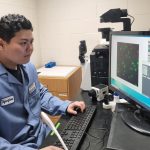Student Research Spotlight: Inês Godet

Inês Godet is interested in how hypoxia, a low or inadequate amount oxygen, in tumors affects breast cancer metastasis. Our tissues and organs have varying oxygen concentrations. For example, the air we breathe has 20% oxygen, but our liver has about 5%, making it mildly hypoxic. We even need hypoxic conditions for certain processes such as embryonic development. In primary tumors though, oxygen concentrations are less than 1%. This is because as tumor cells grow in number very rapidly, they deplete the oxygen in an environment with low access to functional blood vessels.
Godet and her team think that the hypoxic environment in tumors may be conditioning cancer cells to survive metastasis. But once the cells left the primary tumor and became reoxygenated, they couldn’t monitor them. So, her team developed a fate-mapping system to monitor the behavior, biological functions, and migration of breast cancer cells once they left the primary tumor and encountered different oxygen gradients.
Godet first came to the Department of Chemical and Biomolecular Engineering as a visiting student to conduct her Master’s research in Denis Wirtz’s lab. She is currently developing her PhD project under the guidance of Daniele Gilkes. In her free times, Godet is a board member of Portuguese American Postgraduate Society (PAPS)—a network that connects Portuguese graduates with one another in the United States.
Video by Gina Wadas





